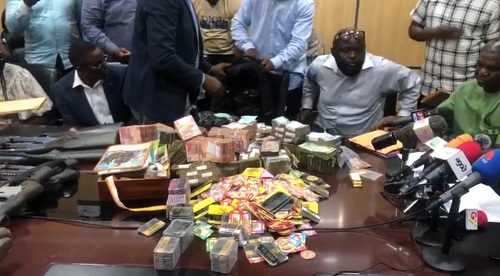The Ghana Gold Board (GoldBod) has seized gold and cash worth GH¢35 million from illegal gold traders so far this year.
In total, the board has conducted 17 operations across four regions of the country, namely Central, Western, Ashanti, and Eastern.
The Anti-Galamsey Task Force of GoldBod also arrested 10 foreign nationals engaged in illegal gold trading and smuggling at a hideout in Asankragwa, a district in the Western Region.
The operation, conducted in collaboration with the National Security Secretariat, led to the seizure of 1.3 kilogrammes of gold valued at approximately GH¢1.4 million, over GH¢1.3 million in cash, and a significant quantity of casino cards. The team also confiscated gun cartridges, 12 pump-action guns, calibrating machines, and other equipment.
The suspects have been identified as Tang Da Jien (41), Wang Chun Ling (41), Wei Dong (41), Li Fu Shou (60), Wei Sheng Xin (39), He Shi Long (57), Wu Cheng Wei (32), Li Ren Neng (44), Fan Zhen Shang (46), and Zheng Xi Chuang (54).
The Managing Director of GoldBod, Sammy Gyamfi, disclosed these details at a press conference held in Accra yesterday. The event was jointly organised by the Board and National Security.
No deportation policy
Mr Gyamfi announced that foreign nationals involved in illegal gold trading would no longer be deported.
“Now, the grace period is over. From here on, anyone caught will face the full rigours of the law,” he said.
The suspects, who are currently in custody, are expected to be arraigned today. If convicted, they face between five and 25 years’ imprisonment, a fine, or both.
Trading prohibition
Mr Gyamfi explained that under the new gold trading regime, foreigners are prohibited from trading in gold in Ghana. He described those involved in illegal gold trading as “enemies of the state”.
“They deprive our people of much-needed foreign exchange, which is essential for the stability of our currency and for national development,” he said. Although a grace period was granted to allow exit from the sector, he noted that some individuals defied the law, and the consequences had now caught up with them.
He revealed that most of the suspects were allegedly operating from private residences and hotels converted into illegal gold depots. Intelligence reports further indicated that they were smuggling gold through complex laundering schemes, including the conversion of cash into casino cards stored in massive safes.
“We discovered detailed gold trading records written in Chinese, documenting weights, purity, and pricing. This is not speculation, it’s a criminal enterprise,” Mr Gyamfi stated.
He added that the suspects had converted their funds into cards, which were found stored in two large safes. Investigations are underway to identify local collaborators, sponsors of the smuggling network, and to determine whether the confiscated firearms were duly registered.
Numerous gold trading records, including receipts written in Chinese, have been retrieved as part of the ongoing investigations.
Supporting development
Mr Gyamfi indicated that the confiscated assets would be used to support development projects in mining communities, including the provision of potable water, schools, and healthcare infrastructure, in line with the Ghana Gold Board Act, 2025 (Act 1142).
He stressed that any confiscation would follow due legal process. “It must be validated by a Tribunal before it can be confiscated. We intend to follow this process to the letter. We are not releasing a single gramme of gold or a single cedi of this money,” he emphasised.
Reaffirming the Board’s commitment to transparency, Mr Gyamfi said all seized items—gold and cash—had been counted in the presence of the suspects and secured in the vaults of the National Security Secretariat.
“No one, and I repeat, no one, can call me to release even a gramme of gold or a cedi of the money,” he declared.

